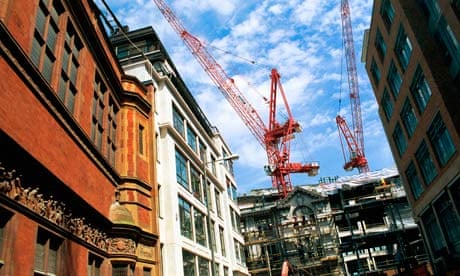Class is everything in Britain. It dictates how the British live and when they die, which children succeed and which fail. Above all else, class imposes silence. Counterfeit controversies obsess the media and politics. When presented with a genuine scandal that cries out for punishment and reform, the talking heads and the professional contrarians say nothing.
Readers would not guess from the "national conversation" that the construction industry is sitting on a story as grave in its implications as the phone-hacking affair – graver I will argue. You are unlikely to have heard mention of it for a simple and disreputable reason: the victims are working-class men rather than celebrities. The parallels between what happened in the news and building businesses are almost exact. As in the media, there was a corporate conspiracy. Sir Robert McAlpine, Balfour Beatty, Carillion, Amec, Skanska, Taylor Woodrow and 34 other construction companies behaved like a secret police force monitoring a subject population. The files of their "Consulting Association" – and what a soothingly bland name they chose – refer to construction companies by a code name.
Anonymous site managers supplied details, often false, of alleged troublemakers in the building trade. Some human resources departments then checked job applicants against the Consulting Association's records, paying £2 per check for the service, and never told the men they rejected why they had banned them for work. In its pomp, the CA was a busy place. Records suggest McAlpine alone spent £28,000 on checks. By the time the Information Commissioner's officials seized its database, 3,400 workers were on the blacklist.
As with News International, there are reasonable grounds for suspecting police collusion. The files contain accounts of building workers attending demonstrations against the BNP, which are highly unlikely to have come from construction industry managers. "They read like police reconnaissance reports," said one investigator for the Information Commissioner, who is also a former police officer. As with News International, there is now a mass legal action. Daniel Boffey, our dogged policy editor, reports in today's news pages that the first of what may be many claims by blacklisted workers has begun. Eighty-six men are suing Sir Robert McAlpine for £17m in lost earnings. By a neat serendipity, McAlpine not only funded the Tory party but also built the Olympic stadium, so the action doesn't lack topical resonance. Its lawyers will claim blacklisters' files contained details of the builders' political views, attitudes towards health and safety, relationships and friendships, which would make a News of the World hack gasp with envious admiration.
At this point, comparison breaks down. Hacking hurt reputations but it did not threaten lives. Blacklisted workers, by contrast, have shared the anger and amazement of the citizens of dictatorships after a revolution. They have gone through files their employers never meant them to see and marvelled at how malicious minds twisted their past to put them on the dole. Like so many other blacklisted men, Dave Smith, a genuine working-class hero and leader of the campaign against the blacklist, wondered why he could never get work. He would turn up to a site with his friends. The foreman would take on his friends but not him. "By 2000, I couldn't sleep. I was defaulting on the mortgage and the kids were on milk tokens." On one occasion, Smith protested after an explosion of compressed air in a tunnel blasted a crater in a school playground. If children had been at school, they would have died. But in the files he found that the spy beside him on the job mentioned only his protests, not the threat to lives.
Construction is a trade where men leave for work in the morning and come back in a coffin at night. Even in 2010-2011, in the middle of a recession and with the construction industry on its knees, 50 died in accidents that might have been preventable. There will be many more coffins when and if growth returns. The construction companies could not be clearer that men who try to enforce minimum safety standards are their enemies. The files included formal letters notifying a company that a worker was the official safety rep on a site as evidence against him.
Construction is a casual industry because companies do not want to employ craftsmen full time: 50% are self-employed and most of the rest are agency workers. Even the British law, so negligent about health and welfare of building workers in many respects, recognises the position of safety reps. The files show that the construction industry sees becoming a rep as grounds for banning workers for life. Even those they label as "not a militant" – and there are many – are on the blacklist because at some point they have spoken about dangers at work.
The blacklisting puts conservative protests about "'elf and safety" and "political correctness gone mad" in their place. The trouble with political correctness in Britain is that it is not nearly mad enough about cowboy multinationals, which regard the lives of casual labourers as dispensable. Steve Murphy, the general secretary of the builders' union UCATT, says that business's influence in politics and the media is having an effect. The coalition has commissioned one Ragnar E Löfstedt, an American academic with a laissez-faire bent, to recommend that self-employed building workers, who pose no threat to others, should be exempt from health and safety rules.
The British Labour movement has inspired few novels. One undisputed classic is The Ragged-Trousered Philanthropists. Robert Tressell's despairing leftwing hero tries to persuade builders of Mugsborough, a fictionalised Hastings, to embrace socialism. The builders won't listen. They respect their employers as their "betters", listen to the advice of religious hypocrites and refuse to fight for their own interests. Tressell's picture of builders welcoming exploitation is not true now and I am not sure if it was true of Edwardian Hastings. Building workers want and need men who will stand up to employers and protect their safety. Naturally, they do not wish to die.
For almost a decade, construction conglomerates blacklisted those who tried to speak on their behalf. In that same period, scores died and hundreds were maimed. It says much about Britain that the loud voices that boom across our media cannot talk about a scandal that is in front of their eyes.

